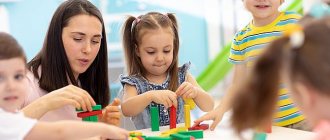A 1.5 year old child is silent, but understands everything.
Sections
Question to the speech therapist:
Dear Anna Vladimirovna! I really count on your consultation on this issue: My daughter is already one and a half years old, she says the only word “HELLO” (hello), and not often. Not “mom”, not “dad”, not “baba” - nothing! She doesn’t say “give me”, and doesn’t ask for anything at all - neither food nor drink; if necessary, she tries to get it herself (and this is rare, mostly she just starts being capricious, and I can already guess what’s going on). Does not repeat after us, does not imitate animal sounds (moo, woof, woof, etc.). At the same time, the child hears well, because he responds to the name, even if I call from the next room, he runs towards the sound of the TV, and is frightened by sharp sounds (at the neighbor’s house, when the walls are being drilled, he begins to cry). The meaning of the words “on”, “give”, “cannot” is understood perfectly. Speech development lags behind from birth - babbling after 3 months, and even then rather scantly, syllables and babbling after 10 months. Can't stand finger games, pulls his hand away and leaves. Since he was a year old, we have been developing fine motor skills - sorting (touching and scattering) cereals, pasta, beads and buttons. He loves books and listens willingly (bright pictures and several lines of text on a page; if there is more text than pictures, he turns to another page). Somewhere after a year, speech activity appeared in the form of gibberish (nothing meaningful, and most importantly, not even a “gibberish” word was assigned to any of the objects or actions). True, sometime after 11 months, my daughter clearly pronounced “A-a-a” when sitting on the potty. Then that too disappeared. Now the only conscious sound in use is “ALYO”, while imitating a conversation on the phone (pressing his hand to his ear) and then uttering another tirade of incomprehensible sounds. He doesn’t address us in any way (only when he cries, he can say ma-ma-ma-ma), but in response to the question “Where is mom (dad, brother, cat)?” turns his head towards the person he is looking for. Emotionally safe, laughs, rejoices at family and friends, gets offended, cries - everything in time. I have already tortured our neurologist, we have completed three rehabilitation courses (she was born premature, at 33 weeks, she was slightly behind in motor development, but by the age of one year she had caught up with her peers), now we are in line for the next one (massage of the speech zones, paraffin, laser for the same speech zones). Maybe you really shouldn’t worry, but just wait? But it’s so scary to miss time, because sometimes not everything can be restored precisely because of inaction. I had high hopes for the kindergarten (everyone claims that our girl will start talking there), but with the kindergarten we, as they say, flew by. Now I’m looking for advice from a professional specialist, and not advice from grandmothers on the bench. Thanks in advance, I really hope for an answer. (Ekaterina)
Answer: Dear Ekaterina, you did the right thing by starting to sound the alarm earlier. Judging by your letter, the girl really has problems with speech, which can and should begin to be eliminated even at such an early age.
You write that the child had a delay in speech development at an early age. The delay in humming, its lack of intonation, the delay in the babbling phase, its failure to address an adult - all these signs are symptoms of speech disorders. The poverty of intonation (from the Latin “to pronounce loudly”, a complex complex of prosodic elements including melody, tempo, timbre, rhythm, intensity and logical stress at the sentence level to express various syntactic meanings and categories, as well as expressions and emotions) is sometimes compensated by the expressiveness of facial expressions , eye. And in your case, the girl resorts to whims, by the intonation of which the mother is able to understand what the child wants at the moment.
The vocabulary of such children accumulates slowly; the first words may appear by three to five years (normally by 1.5 years). Speech in this case is characterized by slurredness, crumpledness, ungrammaticality, and convolutedness.
Continue to develop fine motor skills of the hands, because the centers responsible for hand movement and articulatory movements (lips, tongue, lower jaw, soft palate) are located in the cerebral cortex in the immediate vicinity of each other, therefore massaging and developing the fingers, thereby promoting and the development of articulatory motor skills. If your daughter cannot tolerate finger games such as “Magpie-White-sided”, “Ladushki”, etc., turn to more advanced types of games. Start painting with finger paints, both with your fingers and with your entire palm. Start sculpting with salt dough; it is less toxic for young children, who are eager to try everything on their tongue. I can also recommend games with finger puppets and thimble dolls; this activity is very exciting for young children. Undoubtedly, it is necessary to find a good speech therapist to work with the child, who will help establish emotional contact between you and your girl, promoting the development of the baby’s active speech.
You write about the girl’s reluctance to repeat words and sounds after adults, or imitate the sounds of animals. It is speech imitation that is the most important and effective technique in working with non-speaking children. This is a natural period in the development of children's speech, both normally and in the case of speech disorders.
It is necessary to create conditions in which the child will have a desire to pronounce (repeat) the same sound combinations repeatedly. To do this, you need to establish emotional contact with the child (play the “simplest” games with the baby, which will bring her into a state of activity - physical, fun - emotional and peace - mental), place him in a situation of success (praise him, even for the slightest achievements, if the child did not answer your question, say that he did well, because he tried his best, next time he will definitely succeed).
Imitating the speech of an adult occurs in several stages: - Repetition of amorphous words . These are the very sounds and syllables that carry meaning in a child’s speech (oo-oo-oo, zh-zh-zh, aw-aw, bi-bi, buh, meow, yum-yum, doo-doo, kup-kup , glug-glug, etc.). In addition to correctly pronounced simple words, such as mom, dad, give, na, etc., “abnormal words” may also be present. They are divided into fragment words (for example, milk - “moko”, car - “sina”), onomatopoeic words (for example, am-am - eat, top-top - walk, mud-cow, meow - cat, bang - fell, etc.) and contour words in which the stress and number of syllables are correctly pronounced (for example, “tititiki” - bricks, “patina” - car, “mapata” - shovel). Also, children’s speech may contain words that do not at all resemble the words of their native language or their fragments (in this letter they are called gibberish). Such autonomous speech of a child cannot be reinforced and supported. Also, you should not repeat after the child the substitute words he reproduces; the adult should give the child examples of CORRECT speech. - Repetition of words. At the beginning these are short words, such as: mom, dad, give, na, kitty, duck, etc. At this stage, it is possible to use “light words” in speech (not cat, but kitty). Particular attention should be paid to the child’s mastery of verbs, because They play an important role in the development of children's speech: the more words-actions, the higher the level of its development in the child. - Repeating short phrases. This is the stage of combining several words in one sentence (at the initial stage - 2-3 words). For example, Here is a spoon. There's a ball there. Where's mom?
Games for the development of speech imitation.
- Listen to a poem about an airplane: We’ll build the airplane ourselves, Let’s fly over the forests, Let’s fly over the forests, And then we’ll return to mom.
Let's play airplanes! The planes flew into the sky and buzzed: “U-U-U!” With our arms straight out to the sides, we run around the room, accompanying our movements with the pronunciation of a long continuous sound U.
Similar to this game, we play “Steam Locomotives” (tu-tu), “Steamboats” (s-s-s), “Cars” (zh-zh), etc. And also adapt any other children's poems by adding simple amorphous words (boom, bom-bom, bi-bi, gop-gop, mur-mur, oh-oh-oh, ay-ay-ay, jump-jump, la- la-la, etc.)
In conclusion, I would like to add that on my blog I posted an article entitled “Let’s talk to the “silent” from 1.5 to 3 years old”, I talked about the need for constant communication with the child. I would like to give some ambiguous advice: you need to talk a lot, but not enough, i.e. The adult communicates with the child constantly, but at the same time uses short phrases of 2-4 words in his speech. But the speech therapy joke “Repetition is the mother of stuttering” is not appropriate here, because It is repeated repetition, repeated utterance of everyday situations or artificially created ones (games, activities) that will bring a positive result.
This is roughly how your conversation with your child should be structured:
Washing.
- Let's go wash up. Let's open the tap. No, not this way, the other way. Like this. Where's the soap? Here's the soap. Take soap and wash your hands. Put the soap in the soap dish. Let me help you. Three hands good. Now let's wash off the soap. Place your hands under the water - like this. Now let's wash our face - like this. Take water into your palms and rub your face. Close the tap. Where's the towel? Take a towel and dry your face and hands. Well done! Look how clean it has become.
Let's build a house.
- Look what cubes we have. Show me where the red cube is? That's right, here it is. Where's the yellow one? Where's the blue cube? Right here. Let's build a house out of cubes. What kind of house will it be - big or small? Show me. Big? Fine. Here I placed the cube. Now you bet. put it here...
I wish you patience, imagination and success.
Sincerely, Anna Arnautova.
Consultant's response published 07/13/2009
speech therapist →
What caused the delay in speech development?
The reasons for the development of speech are divided into physiological and social.
Physiological reasons:
- Perinatal pathologies (threat of miscarriage during pregnancy, prematurity, asphyxia during childbirth).
- Heredity.
- Lesions of the central nervous system due to intrauterine and birth injuries, infectious and viral diseases at an early age.
- Hearing impairment.
- Skull injuries.
- Poor development of the speech apparatus, impaired articulation - lips, tongue, facial muscles, soft palate.
- Diseases of a neurological nature.
When a developed and absolutely healthy baby at 2 years old does not speak or does it very poorly, the reasons may be of a social nature:
- The child is deprived of parental attention.
- The baby, on the contrary, is too surrounded by the care of his family and does not feel the need for verbal communication. All his demands are immediately fulfilled, you just need to show with a gesture what he needs. Mothers, having heard a slurred word, immediately understand what it is about. The baby gets used to this attitude and is lazy to talk.
- Unfavorable family environment, constant stress.
- Staying away from mother.
- The family communicates in two or more languages.
- Integrity and stubbornness. The child resists in every possible way the attempts of adults to teach him to speak, showing his character.
- Until the age of 2-3 years, children accumulate vocabulary, and after that they begin to use phrases and extended sentences.
About the benefits of articulation gymnastics and breathing exercises
To teach a child to speak and clearly pronounce sounds, talking and communicating with him alone will not be enough. It is important to do articulation gymnastics at the same time. Training the articulatory apparatus contributes to the correct pronunciation of words in the future.
Below are several articulation gymnastics exercises. Demonstrate and explain to your child how to perform them. He will love this fun idea.
"Pendulum". Open your mouth and move your tongue like a pendulum from side to side, touching the corners of your mouth.
Using your tongue, try to reach the tip of your nose, chin, and cheeks.
"Fence". You need to close your teeth tightly so that your tongue remains behind the fence, and smile widely.
“Open and close your mouth.” Having opened your mouth, you need to stay in this position for a few seconds and then close it.
"Baby Elephant's Trunk" Pull your lips forward like a tube and breathe.
"Piglet." Move your elongated lips in a circle, left and right, up and down.
"Hamster". Take a breath into your mouth, pretending to be a hamster. Alternately deflate the left and right cheek. Then, on the contrary, pull in your cheeks strongly. Inflate and use your palms to deflate them.
What measures to take in case of ZRR?
If you suspect your baby has a delay in speech development, do not put off visiting a specialist.
It is important to take timely measures, since this problem has a steady increase in dynamics, which will subsequently lead to the formation of a delay in psycho-speech development (DSRD) in the child.
Some parents mistakenly believe that speech therapists treat mental disorders. But they will only teach the child to speak various sounds, make sentences orally, and conduct speech therapy massage of the speech apparatus to improve diction.
In case of mental retardation, in addition to a speech therapist, you will need to consult the following specialists:
- neurologist;
- speech pathologist;
- child psychologist.
Only a specialist will be able to identify the problem, if any, and prescribe the correct treatment.
Tempo delay in speech development
A communicative “push” will help to bring the child out of the state of delayed speech. They benefit from communication with speaking peers, speech games and exercises, and classes with a speech therapist, which help children develop speech.
The lion's share of the work on developing the baby's speech will fall on the parents themselves. They are the best teachers for their child.
The tempo delay can be corrected by parents independently. It is enough to approach your work responsibly and devote several hours a day to activities with children.
Techniques and exercises:
- Do not use the TV as background noise, as this negatively affects the speech development of the baby.
- Play educational games. This includes sorters, cubes, cut cards, and inserts.
- Read books, poems, nursery rhymes, and fairy tales to your child before bed.
- Sing funny children's songs and bedtime lullabies.
- Look at pictures of animals with your child and talk about them.
- Watch animated films together, saying the names of the characters and the actions of the heroes.
- Let's drink liquid (compotes, juices, milkshakes) from a straw. This will strengthen the muscles of the mouth and make it easier to reproduce words.
What you should absolutely not do in relation to your baby:
- Compare your child with other people's talking children of friends, relatives, neighbors. Remember that your baby is unique and develops on his own schedule.
- Turn a blind eye to the existing problem. If the baby still shows signs of delayed speech development, you should not let the situation take its course, you should immediately visit a specialist.
- Obsess over. When children at 2 years old have not yet begun to speak, mothers fall into despair. All their thoughts are occupied with one thing: how to make a child speak?



